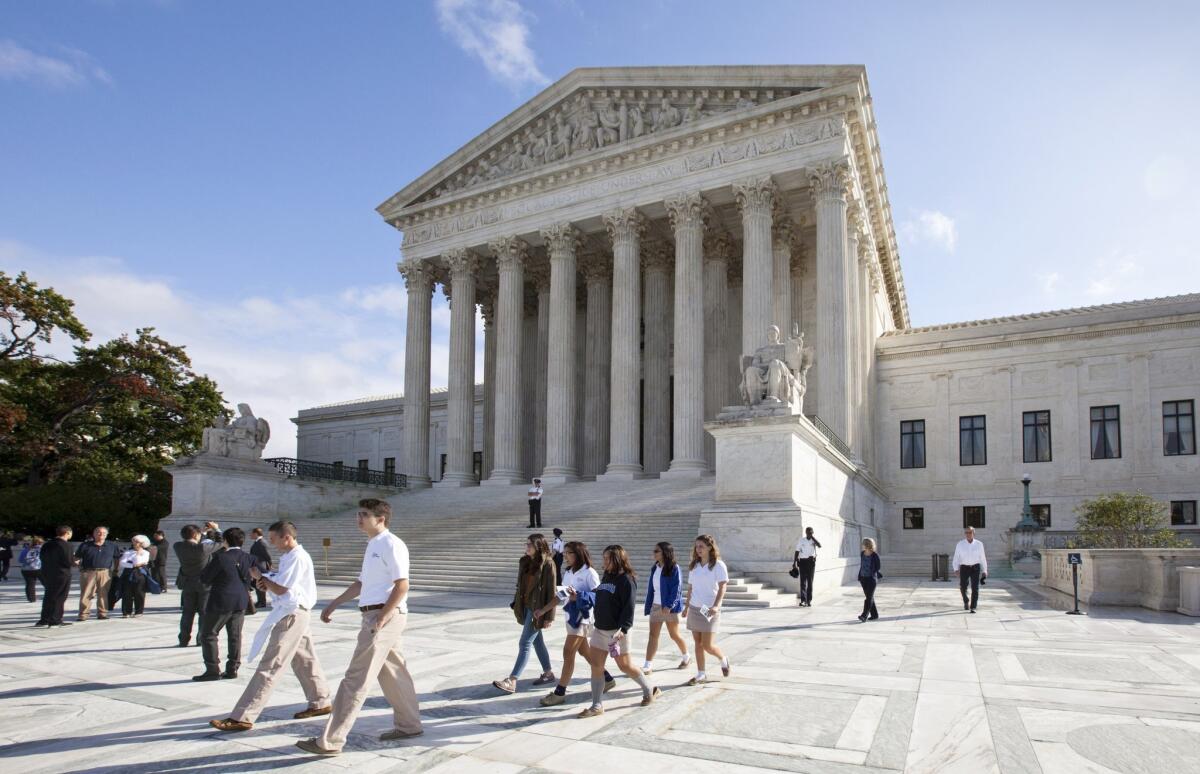Appeals of baseball, insider trading cases among those rejected as Supreme Court opens term

In this Oct. 14, 2014, file photo, people walk outside the Supreme Court in Washington. The Supreme Court is starting a new term on Oct. 5, 2015.
The Supreme Court opened its new term Monday by saying “no” to as many as 2,000 disappointed litigants.
The justices issued a 76-page list of appeal petitions that had been turned down without a hearing. Most of them came from prison inmates, but hundreds more came from people, companies, cities, states and even the U.S. government who filed lengthy petitions explaining why the court should hear their case and review a ruling from a lower court.
Among the many losers on Monday were the city of San Jose, which sought to overturn Major League Baseball’s exemption from anti-trust laws, and the Justice Department, which sought to preserve its broad authority to bring insider trading charges against hedge fund managers who rely on tips from friends and co-workers.
“Like Casey, San Jose has struck out here,” Judge Alex Kozinski wrote in January when the 9th Circuit turned down the city’s suit against the baseball organization.
SIGN UP for the free Essential Politics newsletter >>
San Jose wants a major league baseball team and has looked across San Francisco Bay at the Oakland A’s. But the city says the Giants have blocked the move, fearing the competition.
In its appeal to the high court, lawyers for the city called “professional baseball’s antitrust exemption a relic from another era.” They referred to 1922 when Justice Oliver Wendell Holmes wrote that while baseball was an “exhibition” involving money, it was a mostly local affair and not part of the nation’s flow of interstate commerce. The Supreme Court upheld the exemption again in 1972.
And since then, the justices have been unwilling to revisit the issue. The case of City of San Jose vs. Office of the Commissioner was denied without comment.
The Justice Department, unlike most litigants, can usually count on the court hearing its appeals when it loses a major criminal case. But not so Monday in the case of U.S. vs. Todd Newman.
Federal law does not spell out the crime of “insider trading,” but prosecutors have relied on the laws against stock fraud to police trading by those who profit from the use of inside information about public companies.
But the 2nd Circuit Court in New York dealt the government a blow late last year when it overturned the convictions of two hedge fund managers who made millions based on trading on tips about Dell Corp. The judges said the two hedge fund managers did not know or speak to insiders at Dell, instead picking up tips through a chain of contacts.
U.S. Solicitor General Donald Verrilli Jr. urged the court to hear an appeal. The New York ruling “insulates from liability deceptive acts that undermine the integrity of the markets,” he said.
But Justice Antonin Scalia and several of his colleagues have said Congress should pass a law that clarifies the crime of insider trading, rather than relying on the courts to decide what is the line between seeking information and committing a crime.
On Monday, the court simply listed the case of U.S. vs. Newman as having been denied without a hearing.
On Twitter: @DavidGSavage
ALSO
Nobel Prize in medicine goes to 3 scientists for work on parasite-fighting therapies
California’s racial profiling law is ‘terrible’ legislation, police officials say
Oregon sheriff wrote, ‘Gun control is NOT the answer,’ and residents agree
More to Read
Start your day right
Sign up for Essential California for news, features and recommendations from the L.A. Times and beyond in your inbox six days a week.
You may occasionally receive promotional content from the Los Angeles Times.







